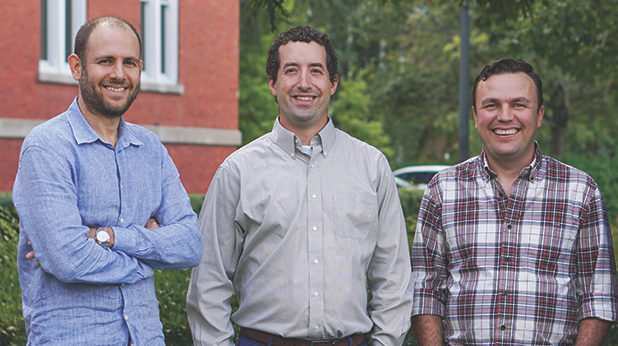
Researchers in the Department of Chemical Engineering are delving into some of the world’s most challenging health issues.
With the goal of improving patient outcomes through personalized medicine and expanding access to medical advances to the developing world, they are backed by some of the biggest funding agencies in the industry.
Improving Personalized Medicine
Personalizing medicine and therapeutics to an individual patient has the potential to address many health issues from cancer and cardiovascular disease to fighting antibiotic resistant bacteria. Through the work of chemical engineering assistant professors Robert Pantazes and Panagiotis Mistriotis — both supported through R35 National Institutes of General Medical Sciences Maximizing Investigators’ Research (MIRA) Awards of $1.75 million and $1.87 million, respectively — advances in personalized medicine are on the horizon.
Pantazes’s research focuses on developing and experimentally testing computational methods to design therapeutic proteins. In his lab, he and his graduate students are examining how to design antibodies better and faster than traditional approaches.
Mistriotis’s approach lies in the field of mechanobiology and will further examine fundamental cellular processes to develop novel therapeutic interventions against the initiation and progression of pathophysiological phenomena, including cardiovascular disease, aging and cancer. As a field of study, mechanobiology is concerned with the mechanisms by which cells sense and respond to mechanical signals. Mistriotis noted that cells in the human body are constantly subjected to these signals, but researchers aim to learn more about how these signals impact cell behavior.
“The widely held view is that cells can sense and respond to these cues but our understanding of the underlying mechanisms remains very limited,” he said. “Our lab explores how physical forces convert into biochemical signals to influence cell behavior.”
Expanding Access to the Developing World
The future of vaccine development is going to be faster, cheaper and more geared toward the needs of the developing world. The technology behind the vaccines of the future will be impacted by the work of Chris Kieslich, assistant professor of chemical engineering.
Kieslich is the department’s latest recipient of the MIRA Award from the National Institute of General Medical Sciences. Kieslich’s five-year, $1.87 million award for his work titled “Development of computational tools for accounting for host variability in predicting T-cell epitopes” marks the department’s third MIRA in two years, alongside Mistriotis and Pantazes.
“What we’re working on through computation is making tools that would be useful for designing new vaccines with a variety of applications that could be developed faster or cheaper because they’re easier to produce and store,” Kieslich said. “In very basic terms, we are developing tools that understand the interactions between a pathogen, such as a virus or bacteria, and the receptors in the immune system.”
The MIRA funding will allow his research team stability and flexibility to enhance scientific productivity and the chances for important research breakthroughs.
“Take COVID-19 for example. So much of the data we have is from the Western world and because of that, the models perform very well for people of those genetic backgrounds but not so much with other parts of the world,” Kieslich said. “Part of what we’re trying to do is develop our models in a way that will allow us to make it accessible for larger parts of the population. Having a platform or a way of developing vaccines that can be tailored for a specific population or individual is a huge possible outcome of our research but we’re really starting at the basic science.”